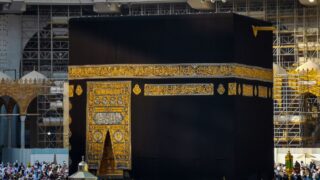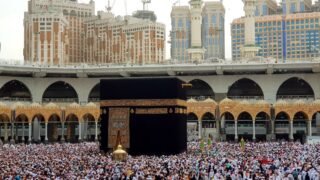Who should sacrifice and what are the conditions?
First, one must have the intention (niyyah) of sacrificing before doing so. The sacrifice has to meet certain conditions, the first of which is the intention. The person who sacrifices must set his or her intention before slaughtering. The sacrifice is not accepted without it because slaughtering is done for different reasons: It could be done for the meat or to get closer to Allah. If the slaughtering is done to seek closeness to Allah, then the intention has to precede the act. It is not required that the person who is actually doing the slaughter mention on whose behalf he is slaughtering because the intention will suffice.
Second, the person who does the slaughtering should be a Muslim. It is preferable that a Muslim do the slaughtering because the sacrifice is an act of worship for the purpose of pleasing Allah Almighty. Therefore it is better if a Muslim does the slaughtering himself or herself. If a Muslim delegates a non-Muslim to slaughter on his behalf, it is acceptable but hated (makruh). This is the opinion of the schools of Ibn Hanbal and Ash-Shafi`i, Abu Thawr, and Ibn Al-Mundhir.
On the other hand, Imam Ahmad and Imam Malik forbid the non-Muslim to slaughter the sacrificial animal; Imam `Ali, Ibn Abbas and Ghabir said it is hated (makruh) for a non-Muslim to slaughter. But Ibn Qudamah argued that if it is permissible for a non-Muslim to slaughter for Muslims for the meat, why should he not be permitted to slaughter for the sacrifice? If a non-believer is permitted to participate in the building of mosques for Muslims, why should he not also be permitted to slaughter the sacrifice for them?
Third, it is preferable for the person who sacrifices to slaughter the sacrificial animal himself or herself. It is preferable for the person sacrificing-be it a man or a woman-to slaughter the animal with his or her own hands. The Prophet (peace and blessing be upon him) slaughtered two rams with his own hands.
Fourth, one should say “Bismillah” (In the name of Allah) before slaughtering. It was reported that the Prophet (peace and blessings be upon him) used to say when slaughtering, “Bismillah, Allahu Akbar” (In the name of Allah, Allah is the Greatest). Ibn `Umar and Qutadah said they don’t know anyone who disagrees with the foregoing. If one has forgotten to utter these words, the sacrifice will be acceptable; and if one adds to it the following supplication it would be even better according to many scholars: “O Allah, This is from You and unto You, so please accept it from me or from the person on whose behalf I am slaughtering.”
The Time of Sacrifice
What to Do with the Sacrificial Meat
The person who is sacrificing should take one-third of the meat for his or her family, give one-third as a gift, and give one-third to the poor. If he or she keeps more than one-third it is all right. The followers of Ibn Hanifah say the more you give to the poor the better.
Paying the Butcher
The followers of Ibn Hanbal declared that the butcher should not be paid with the meat of the sacrificed animal instead of with money. Ash-Shaf`i and the scholars of his school supported this opinion but said that if the butcher is a poor man, it is all right to give him part of the meat as a present the same as others, especially when he has slaughtered the animal and seen the meat that he is deprived of .
Selling the Meat or Skin
The followers of Abu Hanbal declared that it is forbidden to sell any of the meat or the skin of the sacrificial animal, whether this animal is slaughtered to fulfill a vow or slaughtered voluntarily. Imam Ahmad and Imam Shaf`i forbade selling its meat or any part of it. Al-Hasan and An-Nukha`i permitted selling the skin and buying with the money something beneficial to oneself and others; thus he differentiated between the meat and the skin.
Abu Hanifah said to sell the meat and donate the money to the poor. It was reported that Ibn `Umar said to sell the meat and donate the money. Ibn Qudamah, on the other hand, forbid selling the meat and the skin because they are part of one another, but one can use it or donate it as one does with the meat. It was known that `Alqama and Masruq used to tan the skins of their sacrificial animals and use them as prayer rugs.
How to Slaughter
Local health or animal rights laws may restrict where the actual slaughter may take place. Please check with your local mosque for information. If this is the first time you will be doing the slaughtering with your own hands, have someone experienced in this with you to advise and assist.
The conditions for the actual slaughter are this:
1. The animal should be slaughtered by a sharp object which is capable of making it bleed by severing blood vessels, even if the sharp object is a stone or a piece of wood.
2. The slaughtering is to be done by cutting the throat of the animal or by piercing the hollow of the throat, causing its death. The best way is to cut the windpipe, the gullet, and the two jugular veins.
3. No name other than Allah’s should be mentioned over the animal at the time of slaughter.
4. The name of Allah should be mentioned while slaughtering the animal. You should say, “Bismillah, Allahu Akbar.”

















